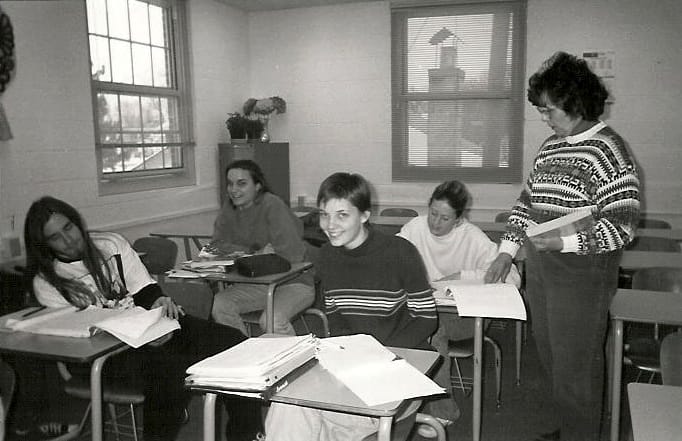I first took a Spanish class in sixth grade, now 24 years ago, though Sesame Street had taught me basic greetings and to count much earlier. I took three years of Spanish in junior high, and another three in high school in my tiny Midwestern town. These six years of language courses were all with Señorita Wright, a woman of Greek heritage who had spent six months studying abroad in Mexico during her undergraduate days. Those days were long in the past though. We celebrated her 60th birthday my freshman year of high school and snarkily commented on reasons she might still use the address Señorita at such an age. I did not take any Spanish as an undergraduate, but a few years later, after deciding I’d like to do research in South America, I enrolled in one semester of a second year college course at The New School. Then took a month of classes at a language school in Lima, Peru one summer when I needed to escape my mundane job as office manager at a New York architectural firm.
When I began fieldwork in Bolivia I remember conversations being endlessly frustrating. I remember a young man telling me “tengo ganas de ti”—something I would have been quite flattered and pleased to hear, given the source—and didn’t understand what “winning” had to do with anything. That man, now one of my greatest compañeros de la vida, was also the interlocutor in my very first empassioned argument in Spanish. I remember feeling, despite my utter despair at the circumstances of that fight, a sense of accomplishment. Like I had finally proven that I could truly express myself. After finishing my dissertation, I enrolled for a two week private course at a Spanish school in La Paz. I hoped to improve my grammar in subjunctive tenses. I took the written test, then met with my instructor. We chatted about my dissertation, my plans to become a professor. We discussed her pregnancy and the different areas of the city she might move to with her boyfriend. At the end of the 20 minute introductory session she told me “I can’t believe you are the same person who took that test. You speak naturally. Your writing seems like an early student.”
Then I moved to Chile for my postdoctoral fellowship, and when I would occasionally escape from Iquique to La Paz for a holiday, and the language felt like home. I would amuse my Paceño friends by intentionally peppering my speech with Chilean slang or conjugations. “Oye, tanto tiempo, weon. Conchatumadre, como estai?” We’d laugh for hours. But eventually the staccato pace, dropped “S”s, and words like “bacan” infiltrated even my quotidian Spanish. When I’d visit La Paz, rather than laughing, they’d shake their heads as if I’d betrayed them a little with my language shift. I remember getting in a taxi at the El Alto airport, 6 months since my last visit, and being utterly taken aback by how slowly the driver spoke to me. I remember being both frustrated by the pace and utterly enchanted by it. And as my time in Chile ended, I began making a concerted effort to re-Bolivianize my language. I would deliberately speak more slowly. Only occasionally would a Bolivian friend call me out on my Chilean intonation. My moment of glory came when a Mexican man told me I speak like a chola. Yes, Bolivian street castellano—that’s what I had inadvertently cultivated, and it made me proud.
But my point here is not just to wax nostalgic on my formación en castellano. Rather it is to think about the relationship of borders, borderlands, border conflicts, and language.
Mendoza-Denton tells the story of meeting an adult gang member, affiliated with an organization that is considered more Americanized and English speaking than their rival. With a simple introduction of her name, rolling the “r” in Norma, she essentially alienated her interlocutor. I began thinking about the ways I employ Bolivian and Chilean accents, conjugation, and vocabulary. I do so strategically. And this has become an invaluable asset for me, particularly working on both sides of a contested border. Though my work does not specifically concern the border dispute (though of course it is almost always contextually relevant in my work), my status as foreign to both countries is incredibly helpful. I know fantastic Chilean anthropologists doing research in the borderland areas between their own country and Bolivia. But I have to admit that in most cases I’d rather have my own positionality than theirs in these endeavors. In Bolivia my friends unabashedly express distain for Chileans as the most egotistical South Americans, in part because “they think they can just rob us of the sea and that makes them great.” At the same time I’m privy to all manner of Chilean commentary on Bolivian relations, from asking me if it would be safe for them to visit La Paz—“they hate us there, right?”, to northerners' claims on the backwardness and criminality of all Bolivians—“they all just come here to use our resources, and so many steal cars or [engage in] other illegal activities.”
Borderlands are complex geospatial formations, but they can only be understood intersectionally, taking things like race, class, gender, modernity, cosmopolitanism, and the varying centre/periphery dynamics of the two (or more) “sides” of the border involved. And certainly language is central to all of these formations. Having the ability to shift one’s own language—thanks to flexible language accumulation—is a privilege even greater than my whiteness in this particular area.

 RSS Feed
RSS Feed
